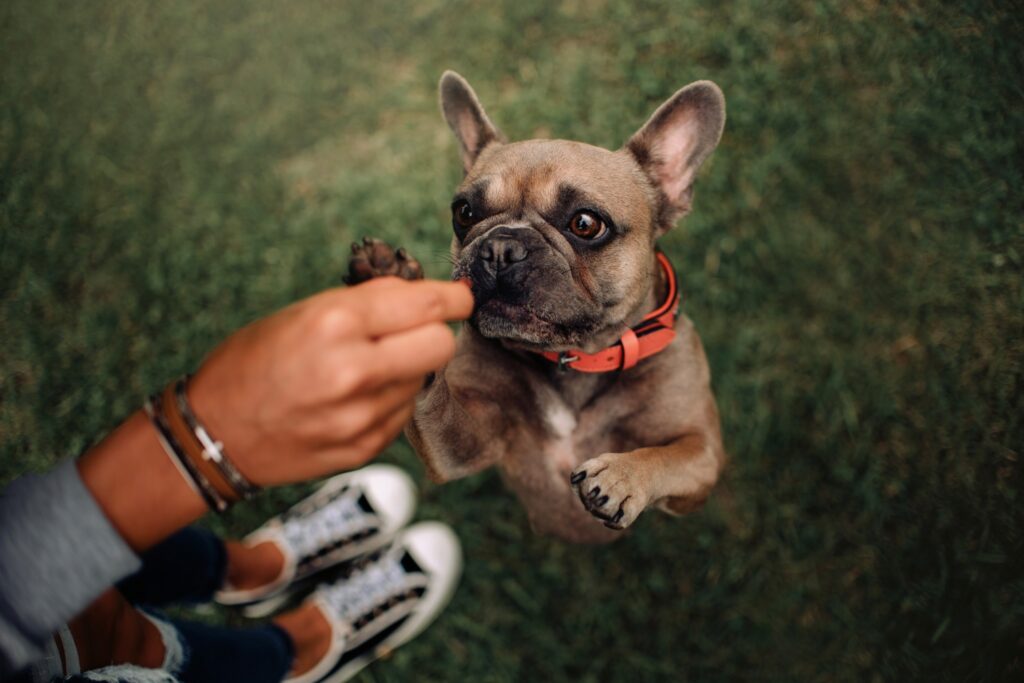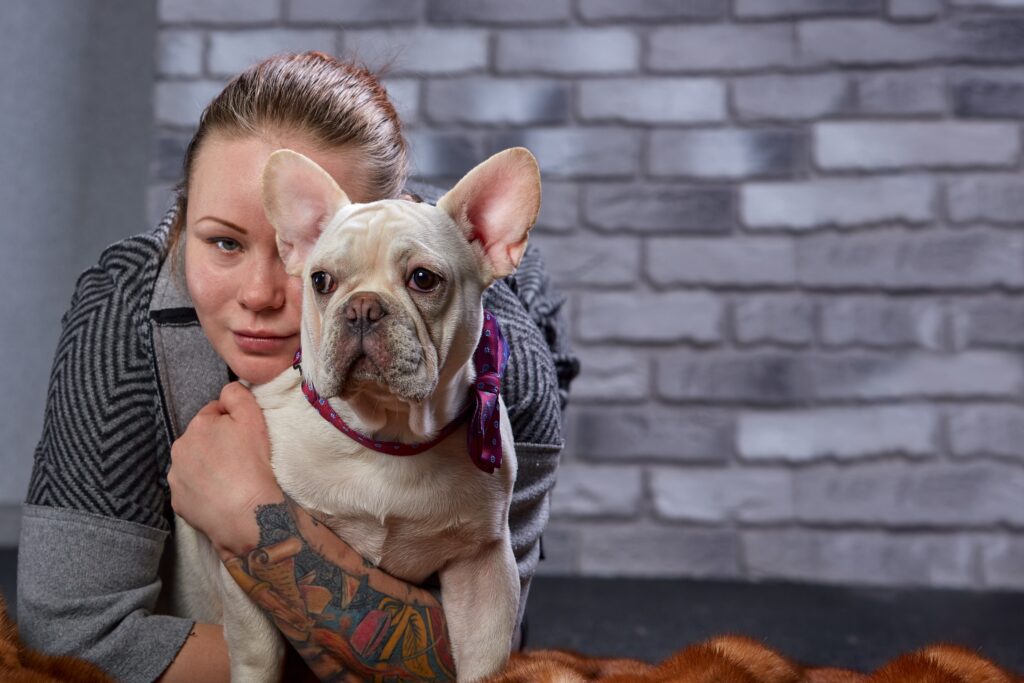Are French Bulldogs Clingy? Expert Analysis and Insights
French Bulldogs can be considered “clingy” as they are known for their strong attachment to their human companions. This breed thrives on interaction and doesn’t like to be left alone for extended periods. A characteristic often described as “separation anxiety” can arise, which manifests through behaviors such as excessive barking, chewing, and even attempts to escape when owners are not present.


However, being clingy also means that French Bulldogs are incredibly affectionate, loyal, and loving. They enjoy spending time with their families, whether it’s snuggling on the couch, going for a walk, or just hanging out at home. While their attachment level can be a challenge for some, it makes them excellent companions for those looking for a constant furry friend.
Table of Contents
Clingy Behavior in French Bulldogs


Clinginess in French Bulldogs can manifest in different ways. Some may whine or pace when their owners leave them alone, while others may follow their owners around constantly. This behavior is often referred to as the “Velcro dog syndrome,” where the dog sticks to their owner like Velcro.
Separation anxiety is a common cause of clinginess in French Bulldogs. This occurs when the dog becomes distressed when separated from their owner. Symptoms of separation anxiety can include excessive barking, destructive behavior, and urinating or defecating in the house.
Owners can help reduce clingy behavior in French Bulldogs by providing them with plenty of exercise and mental stimulation. This can include playing with toys, going for walks, and engaging in training sessions. Additionally, it is important to gradually increase the amount of time the dog is left alone, so they can become comfortable with being by themselves.
In some cases, medication may be necessary to help reduce anxiety and stress in French Bulldogs. Owners should consult with their veterinarian to determine the best course of action for their dog.
Health and Clinginess
French Bulldogs are generally a healthy breed, but like all dogs, they can be prone to certain health issues. When it comes to their clinginess, there are a few health-related factors to consider.
One of the most common health issues that French Bulldogs face is breathing problems. Due to their short snouts and flat faces, they may have difficulty breathing properly, especially in hot or humid weather. This can cause them to become more clingy and seek out their owner’s attention and comfort. This behavior is a natural response to feeling uncomfortable and can be a sign that the dog needs medical attention.
In addition to breathing problems, French Bulldogs may also experience other health issues that can impact their clinginess. For example, if a dog is in pain or discomfort due to an illness or injury, they may become more clingy and seek out their owner’s comfort. It is important to be aware of any symptoms that your French Bulldog may be experiencing and to seek veterinary care if necessary.
Age and Clinginess


French Bulldogs are known for their affectionate and loyal nature. They love being around their owners and can become quite clingy. However, the level of clinginess may vary depending on the age of the dog.
Puppy Stage
During the puppy stage, French Bulldogs are more likely to be clingy as they are still adjusting to their new environment. They may feel scared or anxious when separated from their owners. It is important to provide them with a safe and comfortable space to help them feel secure.
Adult Stage
As French Bulldogs grow older, they tend to become less clingy. They become more independent and may prefer to spend some time alone. However, they still enjoy spending time with their owners and may follow them around the house.
Senior Stage
In their senior years, French Bulldogs may become more clingy once again. They may require more attention and care, especially if they have health issues. It is important to provide them with the love and support they need during this stage of their life.
Exercise and Clinginess
Daily exercise is essential for a French Bulldog’s physical and mental well-being. These dogs have a lot of energy and need an outlet to burn it off. Regular exercise can help reduce anxiety and stress, which can lead to less clinginess.
Physical activity can take many forms, including walks, runs, and playtime in the yard. It’s important to find an exercise routine that works for both the owner and the dog. French Bulldogs are not high-energy dogs, but they still need regular exercise to stay healthy and happy.
Owners should aim to provide their French Bulldogs with at least 30 minutes of physical exercise per day. This can be broken up into shorter walks or play sessions throughout the day.
In addition to physical exercise, mental stimulation is also important for French Bulldogs. Puzzle toys, training sessions, and interactive playtime can help keep these dogs mentally stimulated and engaged. A well-exercised and mentally stimulated French Bulldog is less likely to become clingy and dependent on their owner.
Toys and Mental Stimulation


Toys are a great way to keep French Bulldogs entertained and mentally stimulated. Interactive toys, such as puzzle feeders, can help keep their minds active and prevent boredom. Kong treats are a popular choice for many French Bulldog owners, as they provide a fun and challenging way to keep their dogs occupied.
It’s important to choose toys that are appropriate for your French Bulldog’s size and age. Toys that are too small can be a choking hazard, while toys that are too big can be difficult for them to play with. It’s also a good idea to rotate your dog’s toys regularly to keep them interested and engaged.
Mental stimulation is just as important as physical exercise for French Bulldogs. Boredom can lead to destructive behavior, such as chewing and digging. Providing mental stimulation can help prevent these behaviors and keep your dog happy and healthy.
There are many ways to provide mental stimulation for your French Bulldog. Training and obedience classes are a great way to challenge their minds and improve their behavior. Playing games, such as hide-and-seek or fetch, can also provide mental stimulation and help strengthen your bond with your dog.
Training and Clinginess
French Bulldogs are known for being a breed that can be quite clingy. However, with proper training, this behavior can be managed.
One effective training technique is positive reinforcement. This involves rewarding good behavior with treats or praise. By doing this, the dog will learn that certain behaviors are desirable and will repeat them in the future.
Crate training can also be helpful in managing clinginess. By providing a safe and comfortable space for the dog, they can learn to feel secure and independent. It is important to introduce the crate gradually and use positive reinforcement to encourage the dog to use it.
If the clinginess is severe, it may be necessary to seek professional help from a behavioral specialist. They can assess the dog’s behavior and provide guidance on how to manage it effectively.
It is important to note that training should be done in a neutral and confident tone. Punishing or scolding the dog for clingy behavior can be counterproductive and may even worsen the behavior. Consistency and patience are key in training a French Bulldog to manage their clinginess.
Socialization and Clinginess
Socialization is crucial for French Bulldogs as they are naturally social animals and thrive on human companionship. A lack of socialization can lead to clinginess and anxiety, which can be problematic for both the dog and their owner. It is important to start socializing a French Bulldog from a young age, ideally between 3 and 14 weeks old, as this is when they are most receptive to new experiences.
During the socialization process, it is important to expose French Bulldogs to a variety of people, including children, adults, and strangers, as well as other dogs and animals. This can be done through puppy classes, dog parks, and other socialization opportunities. By doing so, French Bulldogs can learn to interact with others in a positive way and become more confident and independent.
In addition to socialization, providing French Bulldogs with plenty of companionship can also help reduce clinginess and separation anxiety. French Bulldogs thrive on human interaction and need plenty of attention and affection from their owners. Ensuring that they have plenty of opportunities to interact with their human companions can help prevent them from becoming overly attached and anxious when left alone.
Dealing with Clinginess


French Bulldogs are known to be affectionate and loyal companions, often forming strong bonds with their owners. However, this can sometimes lead to clinginess, which may become problematic if not addressed properly. Here are some tips for dealing with clinginess in French Bulldogs:
Independence and Boundaries
It’s important to teach your French Bulldog to be independent and respect boundaries. This can be achieved by gradually increasing the amount of time they spend alone, starting with short periods and gradually increasing the duration. It’s also important to establish clear boundaries, such as not allowing your dog to follow you into certain rooms or jump on furniture.
Leaving Them Alone
While it’s important to teach your French Bulldog independence, it’s also important to ensure that they don’t feel abandoned or neglected. Leaving them with interactive toys or puzzle feeders can help keep them entertained and mentally stimulated while you’re away.
Routine
Establishing a routine can help your French Bulldog feel more secure and less anxious. This includes setting regular feeding times, exercise routines, and bedtime schedules. Consistency can help your dog feel more comfortable and less likely to exhibit clingy behavior.
Environment
The environment in which your French Bulldog lives can also affect their behavior. Providing a comfortable and safe space for your dog, such as a crate or designated area, can help them feel more secure and less anxious.
Resources for Bulldog Owners
There are many resources available for French Bulldog owners who are dealing with clinginess or other behavior issues. Blogs and online forums can provide valuable advice and support from other owners who have experienced similar issues. It’s also important to consult with a veterinarian or professional dog trainer if you’re having difficulty managing your dog’s behavior.
Other Behavior Traits
While French Bulldogs are often characterized as clingy, they exhibit a range of other behavior traits as well. Here are some of the most notable ones:
- Stubbornness: French Bulldogs can be stubborn and difficult to train. They may require patience and persistence from their owners.
- Licking: French Bulldogs are known to be frequent lickers. They may lick their owners as a sign of affection or to show submission.
- Possessive: French Bulldogs can be possessive of their toys, food, and even their owners. They may exhibit aggressive behavior if they feel their possessions are being threatened.
- Aggressive: While French Bulldogs are generally friendly, they can exhibit aggressive behavior if they feel threatened or if they perceive their owners to be in danger.
- Lapdog: French Bulldogs are known to be lapdogs and enjoy spending time with their owners. They may seek attention and affection from their owners.
- Adaptable: French Bulldogs are adaptable and can thrive in a variety of living situations, including apartments and houses.
- Intelligent: French Bulldogs are intelligent and can learn new tricks and commands quickly.
- Explorer: French Bulldogs enjoy exploring their surroundings and may require regular exercise and mental stimulation.
Overall, French Bulldogs are complex creatures with a range of behavior traits. While they may be clingy, they also exhibit a variety of other characteristics that make them unique and beloved pets.
